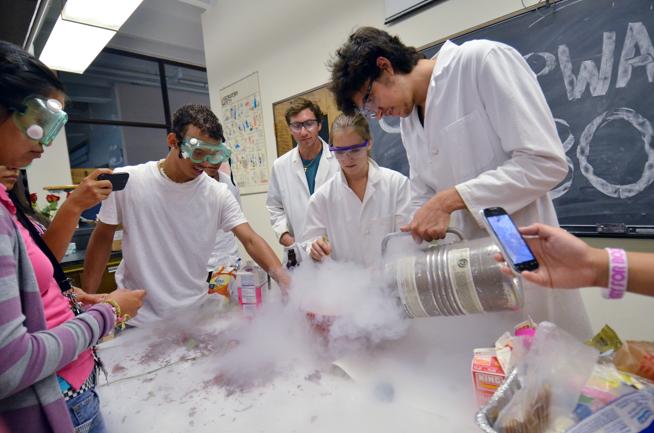By Elizabeth Hernandez
Daily Camera (CU News), August 8, 2017 —
Dillen Peace, a 20-year-old from a Navajo Nation reservation in Arizona, said he wouldn’t be forging his path at Dartmouth College without the support of a University of Colorado program designed to prepare Native American students for college.
“It’s the challenge that a lot of native youth need in just exposure to something we can work toward,” Peace said. “That’s what I felt like I didn’t have in my community. There’s talk about college, but not to the degree of what this program offered.”

CU Upward Bound – University of Colorado Boulder
The CU Upward Bound program welcomes around 100 Native American high school students from eight reservations across the country to campus for six- week summer sessions.
The program, which caters to low-income and first-generation college students, can begin as early as a student’s freshman year of high school, and students are invited back summer after summer to take classes, bond and get academic support. CU Upward Bound has a retention rate above 90 percent for returning high school students, according to CU officials.
The Federal Trio program also remains a resource after students graduate from high school.
Peace found out about the camp through his older brother, applied and was accepted for the summer of 2012.
Coming from a tight-knit community in Rock Point, Ariz., Peace said the sprawling Boulder campus, rigorous classes and peers who became family opened his eyes to the vast opportunities available to him after high school graduation.
But it was a more personal epiphany the camp inspired that he said benefitted him the most.
“When I came back home, I realized how important my education was,” Peace said. “And when I was there at camp in the summer, I realized how important my culture and language were. Being away from it during the summer helped me to realize that I need both — my education and my culture — and that they can support each other. If I wanted to succeed academically and with post-secondary aspirations, I needed a strong foundation of my culture and my beliefs, and I felt like this program really made me believe they can go hand in hand.”
Peace pointed to Tanaya Winder, director of the CU Upward Bound program, as one of the main reasons his experience was so positive.
Winder was raised on a Southern Ute reservation in Ignacio. She came to the Upward Bound program as a high school student, returned as a resident adviser in 2007 and has worked her way up so she can serve the program that gave back to her.
Winder loves that the camp provides a support system full of people who understand what life on a reservation is like — something, she said, that can be difficult to explain or relate to if not personally experienced.
“When you grow up on a reservation, your community is really close,” Winder said. “They all just understand that way of life, and you never have to explain that part of your life. It’s hard to get professors to understand when things happen in your community and you maybe need to take time off or miss a test. How do you build that resilience to know even though they’re saying this doesn’t matter, I’m strong enough to know my culture and heritage matters? We help them navigate those pathways.”

University of Colorado chemistry graduate student leads experiments for high school students attending the Upward Bound program. (Glenn J. Asakawa / Courtesy University of Colorado)
Peace said not a lot of people from reservations go to college far from home.
From 1976 to 2014, the percentage of American Indian and Alaska Native college students went from 0.7 percent to 0.8 percent, according to the National Center for Education Statistics.
Between 50 percent and 83 percent of students in CU Upward Bound continue on to a college career, Winder said.
[Upward Bound program prepares Native American students for college experience]
Winder and the Upward Bound program assured Peace he had the potential to succeed at Dartmouth.
“I truly believe I wouldn’t be here without this program and Tanaya,” he said. “She was always there and always made it known to every single student that she was willing to help us with whatever: homework, applying to college, letters of recommendation or even just emotional support and advice.”
Peace’s greatest struggle has been managing to maintain his cultural identity in a college setting. As a junior, Peace sees a path for his future forming. The studio arts and Native American studies double major is leading him to explore art schools post-graduation.
“This program is much more than the three summers you’re there,” Peace said. “I still go to Tanaya with questions. There are so many ways I look to this program and realize I wouldn’t be here without it.”
To find out about eligibility and the application process, visit colorado.edu/cuub.










